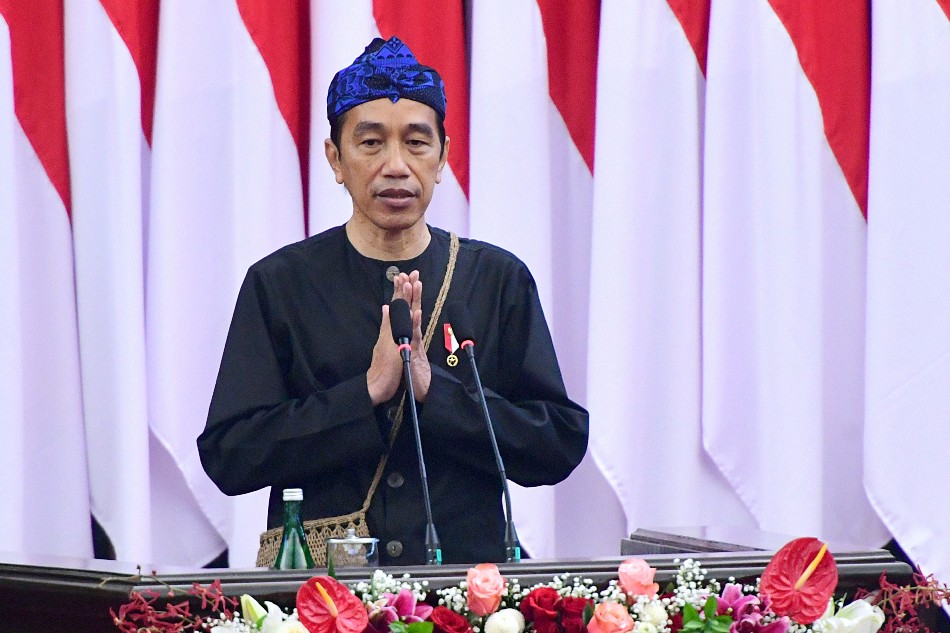Indonesia survey shows president's approval hit by handling of pandemic | ABS-CBN
ADVERTISEMENT

Welcome, Kapamilya! We use cookies to improve your browsing experience. Continuing to use this site means you agree to our use of cookies. Tell me more!
Indonesia survey shows president's approval hit by handling of pandemic
Indonesia survey shows president's approval hit by handling of pandemic
Kate Lamb and Agustinus Beo Da Costa,
Reuters
Published Aug 26, 2021 06:55 AM PHT
JAKARTA—Indonesian President Joko Widodo's approval rating has fallen to the lowest level in five years on the back of a devastating second wave of coronavirus infections, a survey released on Wednesday showed.
JAKARTA—Indonesian President Joko Widodo's approval rating has fallen to the lowest level in five years on the back of a devastating second wave of coronavirus infections, a survey released on Wednesday showed.
Conducted by pollster Indikator Politik Indonesia, the survey showed that 59% of respondents were satisfied with the president, the lowest ranking since March 2016.
Conducted by pollster Indikator Politik Indonesia, the survey showed that 59% of respondents were satisfied with the president, the lowest ranking since March 2016.
The survey, which involved 1,220 respondents, was conducted between July 30 to August 4, while the country was in the throes of a virulent virus wave that led to overflowing hospitals and oxygen shortages on the densely populated island of Java.
The survey, which involved 1,220 respondents, was conducted between July 30 to August 4, while the country was in the throes of a virulent virus wave that led to overflowing hospitals and oxygen shortages on the densely populated island of Java.
Indonesia has recorded more than 4 million cases of the coronavirus, and over 129,000 deaths, among the highest tallies in Asia.
Indonesia has recorded more than 4 million cases of the coronavirus, and over 129,000 deaths, among the highest tallies in Asia.
ADVERTISEMENT
"While the lower approval rating for Widodo is mainly caused by the pandemic and the government's largely inconsistent and confusing responses to the health crisis, it is unlikely the only factor," said Todd Elliot, a senior analyst at Concord Consulting.
"While the lower approval rating for Widodo is mainly caused by the pandemic and the government's largely inconsistent and confusing responses to the health crisis, it is unlikely the only factor," said Todd Elliot, a senior analyst at Concord Consulting.
"Trust in a government in Indonesia normally decreases if the economy is perceived as underperforming and the latest round of coronavirus curbs have hit businesses particularly hard."
"Trust in a government in Indonesia normally decreases if the economy is perceived as underperforming and the latest round of coronavirus curbs have hit businesses particularly hard."
The president said last week in his annual state of the nation speech that there was a need to strike a balance between health and economic interests during the pandemic.
The president said last week in his annual state of the nation speech that there was a need to strike a balance between health and economic interests during the pandemic.
Overall, 54.3% of respondents surveyed said they trusted the president to properly manage the health crisis, while perceptions of the country’s economic situation were the worst since 2004.
Overall, 54.3% of respondents surveyed said they trusted the president to properly manage the health crisis, while perceptions of the country’s economic situation were the worst since 2004.
The survey indicated widespread dissatisfaction with social restrictions intended to stem the spread of the virus that have been in place since early July.
The survey indicated widespread dissatisfaction with social restrictions intended to stem the spread of the virus that have been in place since early July.
Restrictions were eased on Monday in certain regions, including in Jakarta, to allow for limited capacity at malls, restaurants and places of worship after a recent drop in cases.
Restrictions were eased on Monday in certain regions, including in Jakarta, to allow for limited capacity at malls, restaurants and places of worship after a recent drop in cases.
Only 42% of respondents agreed with the curbs, the survey showed.
Only 42% of respondents agreed with the curbs, the survey showed.
With more than 50% of Indonesians employed in the informal sector, the curbs have impacted people's livelihoods hard with 79.2% of respondents saying their income had declined during the pandemic, and 53.3% describing their household economic situation as worse, or much worse. (Reporting by Agustinus Beo Da Costa in Jakarta and by Kate Lamb in Sydney; Editing by Ed Davies)
With more than 50% of Indonesians employed in the informal sector, the curbs have impacted people's livelihoods hard with 79.2% of respondents saying their income had declined during the pandemic, and 53.3% describing their household economic situation as worse, or much worse. (Reporting by Agustinus Beo Da Costa in Jakarta and by Kate Lamb in Sydney; Editing by Ed Davies)
RELATED VIDEO:
ADVERTISEMENT
ADVERTISEMENT



